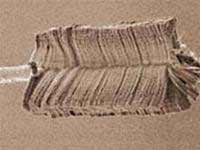“Suction Sweepers” for Blood Vessels
 American scientists have successfully created the world’s smallest “suction sweepers” made from carbon nanotubes.
American scientists have successfully created the world’s smallest “suction sweepers” made from carbon nanotubes.
These sweepers, with a diameter only a fraction of that of a human hair, are designed to “sweep” debris from tiny blood vessels that are blocked, clean dust from precision machine parts, or paint small measuring devices that are invisible to the naked eye.
Several medical companies have already placed orders for the first production run of these nanotubes.
Human Sense of Smell Rivals that of Dogs
Researchers in the United States have discovered that human olfaction is as sensitive as that of dogs.
This is because humans perceive odors not just through the nose, but through the entire body, thanks to a special neural center that specializes in identifying the sources of external stimuli.
According to the scientists, this holistic sensory ability is a unique trait of humans that no other animal possesses.
Crows: The Smartest Birds
Scientists assert that crows are the most intelligent of all bird species. In the streets of Japan, crows often perch on either side of the road, waiting for traffic lights to turn red. They then swoop down to drop hard-shelled nuts onto the road.
When vehicles roll over and crack the nuts, the crows wait for the next red light to retrieve the nutmeat that drivers have accidentally shelled.
 Robots with Human-like Personalities
Robots with Human-like Personalities
Researchers at the Intelligent Robotics Research Center in South Korea have successfully developed a computer program capable of giving robots “human-like” personalities, such as joy, sadness, anger, hunger, thirst, fear, and happiness.
This achievement poses a new challenge for humanity: should we continue to “intelligentize” robots, considering that one day they may “revolt” and demand “citizen” rights like humans?
Miraculous Toothpaste
Japanese scientists have successfully created a toothpaste that could potentially put dentists out of business! This toothpaste can easily restore cavities and cracks in teeth caused by decay and other dental diseases without painful procedures or complex dental solutions.
The ingredients of this toothpaste closely resemble tooth enamel and can be directly applied to cracks and cavities. After three minutes, the toothpaste crystallizes and bonds firmly to the tooth structure.
This toothpaste is safe for health; the difference between artificial enamel and natural enamel is only distinguishable under a microscope.
 Batteries from… Urine
Batteries from… Urine
Scientists in Singapore have successfully developed a battery powered by human urine, providing a tiny energy source for inexpensive, single-use analysis tests in the medical field, primarily for diagnosing various diseases, starting with diabetes.
Dr. Ki Bang Lee believes that soon, individuals will be able to easily monitor their health at home using these simple, single-use testing kits without the need for complex external power sources.
Nano Foods
A unique nano beverage developed by engineer Manuel Marquez-Sanchez of Kraft Foods allows customers to purchase a specific drink and then add nano particles to transform it into any beverage of their choice, with desired colors, flavors, and aromas.
Currently, the nano food market is valued at $3 billion. By 2010, this market is expected to reach $20 billion. In the near future, beverages or foods with heart disease healing properties may appear on the market.
Mice that Can Sing Like Birds
 Biologists have discovered that some species of mice can sing beautifully, comparable to birds, but at ultrasonic frequencies that the human ear cannot distinguish.
Biologists have discovered that some species of mice can sing beautifully, comparable to birds, but at ultrasonic frequencies that the human ear cannot distinguish.
To hear the mice sing, one must record their vocalizations and then alter the pitch and frequency to levels that can be heard as normal sounds. The “music” created by the mice conveys very different messages.
They often sing during mating season, expressing the “personalities” of their mates. Additionally, while singing, mice release pheromones into their environment to attract one another.
Thuy Duong




















































